- Home
- Blair Bancroft
A Gamble on Love
A Gamble on Love Read online
A Gamble on Love
Title Page
Chapter One
Chapter Two
Chapter Three
Chapter Four
Chapter Five
Chapter Six
Chapter Seven
Chapter Eight
Chapter Nine
Chapter Ten
Chapter Eleven
Chapter Twelve
Chapter Thirteen
Chapter Fourteen
Chapter Fifteen
Chapter Sixteen
Chapter Seventeen
Chapter Eighteen
Chapter Nineteen
Chapter Twenty
Chapter Twenty-one
Chapter Twenty-two
Epilogue
A Gamble on Love
by Blair Bancroft
Published by Kone Enterprises
at Smashwords
Copyright 2011 by Grace Ann Kone
For other books by Blair Bancroft,
please see http://www.blairbancroft.com
Smashwords Edition, License Notes
This book is licensed for your personal enjoyment only. This ebook may not be re-sold or given away to other people. If you would like to share this book with another person, please purchase an additional copy for each recipient. If you’re reading this book and did not purchase it, or it was not purchased for your use only, then please return to Smashwords.com and purchase This ebook is licensed for your personal enjoyment only. This ebook may not be re-sold or given away to other people. If you would like to share this book with another person, please purchase an additional copy for each recipient. If you’re reading this book and did not purchase it, or it was not purchased for your use only, then please return to Smashwords.com and purchase your own copy.
~ * ~
1Prologue
Miss Aurelia Trevor unhooked her knee, disengaged her stirrup, and slid down from her side-saddle unaided, tossing the reins of her lathered horse to a startled groom. Grabbing the long tail of her sable velvet riding habit and tossing it over her arm, she stalked down the drive with a purposeful stride seldom seen in well brought up young ladies. She plunged down a set of outside steps to the basement of Pevensey Park, her riding boots beating an echoing tattoo on the flagstone hallway. She threw open the door to the spacious estate room and came to an abrupt halt, glaring at its sole occupant. Mr. William Tubbs—a sharp-faced man with nearly sixty years in his dish—was seated at the broad estate desk, silhouetted against a jumbled background of shelves holding an astonishing variety of leather-bound books, from estate records to serious treatises on agriculture. Mr. Tubbs took his time in rising to his feet. His eyes flicked over her. Assessing.
Ah, but he had never done that when her father was alive! “Mr. Tubbs,” Miss Trevor demanded, “why is no work being done on the weir?”
William Tubbs smirked at her. Yes, confound it, that was the only word Miss Trevor could think of to describe the look on her estate manager’s face.
“Lord Hubert says the work isn’t necessary.” Tubbs told her.
Miss Trevor’s fine bosom heaved as she took a deep breath. Unfortunately, she caught Mr. Tubbs’s sudden interest in her fitted jacket. Nearly sputtering with rage, she declared, “You know quite well Lord Ralph told you to see to that work as soon as the harvest was in. It was one of his very last orders. You cannot ignore it simply because Lord Hubert hasn’t the slightest idea what it takes to run a property of this size.”
Mr. Tubbs shrugged, making not the slightest effort to disguise his disinterest in her opinion. “No choice, miss. Lord Hubert holds the purse strings, as you very well know.”
“That may be,” Miss Trevor raged, “but Pevensey Park is mine, and we will have floods in the spring if that weir is not fixed. And the work must be done before winter sets in.”
“Can’t be helped, miss. You’ve no say in the matter. Lord Hubert is master here now.”
“Lord Hubert is an—” Miss Trevor choked off an unseemly criticism of her uncle and guardian. “By the time I gain control of my own property, it will be in ruins,” she declared from between gritted teeth.
“There’s no help for it,” William Tubbs repeated stubbornly. “I take my orders from Lord Hubert.”
For a moment Miss Trevor was silent, a sly look gradually taking the place of fury. “I have some pin money put by, Mr. Tubbs. Order the work done, and I shall pay for it myself.”
Mr. Tubbs, whose own mother considered him ferret-faced, shook his head. “Can’t do it, miss. I’d get the sack for sure.”
“I wonder, Mr. Tubbs,” said Miss Aurelia Trevor of Pevensey Park, Kent, “whether it has occurred to you that in the fullness of time I shall have total control of my lands. It is possible—and I am certain you will agree—that you are merely postponing the day when you are sacked.”
With this parthian shot, Miss Trevor turned in a flurry of swishing dark velvet and stalked off down the hall, startling Cook and her helpers as she dashed through the kitchen, sporting a ferocious scowl, before ascending into rarified atmosphere of the state rooms on the ground floor. She ran up the great front staircase, waved off her maid Tilly, and flung herself onto one of the window seats in her corner room. Think. She had to think. Five more years of her uncle’s domination was inconceivable. It wasn’t supposed to have been like this. Pevensey was hers. She would not let it be destroyed!
~ * ~
Chapter One
And now, a scant six weeks after her confrontation with Mr. Tubbs, Miss Trevor’s dreams and hopes were down to a last slim thread, dangling in the wind. Clasping a fine cashmere shawl around her shoulders to stave off the nip in the October air, she stood, all alone, on the flagstones of the south terrace and surveyed her acres.
For the fourth time in five generations the ownership of Pevensey Park had descended through the female line. Originally built by the Duke of Alburton as a wedding gift for a favorite younger son, the estate had escaped entail by passing, as a marriage portion, through a nearly unbroken succession of daughters. Whether this was a curse or a blessing depended entirely on one’s point of view. Or gender. Until the last two months Miss Trevor had considered it a blessing. At the moment, however, she was truly frightened. She was on the verge of losing, and rapidly discovering desperation.
Aurelia leaned against the stone wall at the outer edge of the upper terrace, yearning for the days of loving security, when her mama and her papa were alive, and all was right with the world. When Pevensey Park was a wonder to be savored and enjoyed, and not a dreadful burden over which she had no control.
Pevensey. Beautiful Pevensey. A young landscape gardener, greatly under the influence of Lancelot “Capability” Brown, had convinced her grandfather to remodel his park in the wilderness style so much in vogue in the mid eighteenth century. Therefore, below the terraces was a vast sweep of well-scythed grass, gradually descending to a deliberately invisible ha-ha, with fat white sheep dotting the far upslope of the Kentish hills. Irregularly shaped and carefully placed clumps of trees framed the grassy slope, with a blue-gray pond lying in the shade of the spinney on the left.
Also on the left, a wooden bridge lead to a small rotunda, placed with exquisite care to the view, on the far side of a bubbling stream. Though Miss Trevor might have preferred a medieval ruin as a playhouse, the small rotunda, with its six columns and domed ceiling, had been her particular hideaway as a child. A surge of nostalgia, almost pain, swept over her, as she recalled the excitement of running over the lawn, crossing the arched wooden bridge, and entering a world of magic and imagination such as only a child can know.
She loved Pevensey Park. Every tree, shrub, and blade of grass. Every sheep on the hillside, every wheat field, hop vine, and
dairy cow; every last flower, fruit, and vegetable grown in the market garden hidden behind the picturesque stands of trees. For Pevensey Park, having no great family fortune to support it, had been forced to make its own way in the world. And, fortunately, the Park had been blessed with a succession of level-headed, commonsensical owners. It was a thriving concern. And its present owner, Miss Aurelia Trevor, was quite determined it would stay that way.
Slowly—almost fearing the impact on her current heightened emotions—she turned and looked at the house. Although not the product of the great Inigo Jones himself, Pevensey Park was classic Palladian, its cream-colored façade and perfect symmetry shimmering in the early afternoon sun. The terraces on which she stood were also a remnant of the Palladian era, her grandmother having refused, in no uncertain terms, the landscape architect’s attempt to sweep away all vestiges of the old formal gardens. For which Aurelia was most grateful. Even now, in early October, she could lean on the balustrade and look down on geometrically laid out beds of dahlias, mums, snapdragons, asters and roses, backed by a few lingering hollyhocks and rose of Sharon. Green was lovely, but what a bleak world it would be if there were no flowers.
“Miss? Miss Aurelia?” Biddeford, the Park’s butler, was beside her, holding a silver tray on which rested a visiting card. “Lord Hanley is here.”
Lord Hanley. Her last hope. Would he be the savior Pevensey Park needed? If only she had been able to have a Season, find the proper consort for her acres . . .
But, first, her beloved mama had succumbed to a slow wasting disease and then, while they were still in mourning, her dear papa had passed on as well. From a broken heart, everyone said, and Aurelia was inclined to agree. Once, they had all been so happy . . .
And now, here she was, only six months after her papa’s death, and already several weeks into a search for a husband, having been forced into giving up all hopes of independence by a calamitous combination of events she did not care to dwell on. And yet she must. For without a stern enumeration of the anguish, disappointments, and frustrations of the last few months, how would she gather the courage to extend a proposal of marriage to a perfect stranger?
Miss Trevor sagged back against the balustrade, eyes closed, fighting for composure.
Papa, how could you?
Yet, truthfully, how could Lord Ralph have anticipated that his trusted friend and neighbor, Marcus Yelverton, would pass on—also well before his time—leaving her to the sole guardianship of Lord Hubert, her papa’s greedy younger brother? The Trevor brothers, younger sons of the Marquess of Huntsham, had come into the world well hosed and shod, as the saying went. Nonetheless, the marriage of Lord Ralph, a second son, to the only child of the owners of Pevensey Park had been considered a coup of no little proportion. Lord Hubert Trevor, the third son, had had to settle for a lady with a much less impressive dowry, and had never quite forgiven either his eldest brother for being heir to a marquisate or Lord Ralph for acquiring Pevensey Park.
And yet that old saying—Blood is thicker than water—proved true. Lord Hubert had been appointed co-guardian with Mr. Yelverton, and until Miss Aurelia Trevor reached the advanced age of five and twenty, they must approve even the slightest expenditure. And now, since Mr. Yelverton’s unfortunate demise, her fate was solely in the hands of Lord Hubert, who was proving to be impossible. Obstinate. Heedless, if not positively stupid. Or perhaps—the ugly thought kept popping up—simply vindictive.
Worse yet, Lord Hubert had a son—known since infancy as The Terrible Twyford. And, quite shockingly, Twyford had begun making assumptions about his inevitable union with his cousin even before Lord Ralph’s casket was lowered into his grave. Horrified, Aurelia had nearly boxed his ears. His mama had dragged him away, but Aurelia caught that part of her scold where Lady Hubert informed her son he was a silly boy for rushing his fences. As his papa had told him, “slow and easy over the ground” would do it.
Slow and easy. Twyford? Neck or nothing was more his style.
Nor was her precarious situation aided by William Tubbs’s continued obstinance, nor the intransigence of her papa’s solicitor. Not even Pevensey’s close neighbor, Squire Stanton, could be brought to believe that a female should have any say in governing her own property. In fact, less than a week after her disturbing scene with Mr. Tubbs, Miss Trevor received a visitor. Harry Stanton, son of the squire and a friend since childhood, came trotting up to Pevensey Park’s impressive front portico. He was dressed in his Sunday best, looking fine as a fivepence. Aurelia scarcely recognized him.
Nor did she recognize his fidgets. Harry had run tame at Pevensey since he had been old enough to sit a horse. But on this particular day he looked as if his cravat were strangling him, his thick neck showing as red as raw beef beneath the not-so-perfectly arranged folds of white linen. His dark blue superfine jacket managed to look crumpled in spite of being stretched tight across his broad shoulders, and his waistcoat appeared in danger of popping a button or two as it strained over a figure already showing a tendency for a too-great enjoyment of food and drink.
Yet because the thought of Harry as a suitor had never once occurred to her, Miss Trevor was considerably surprised when, after solemnly greeting Aurelia’s companion, Miss Augustina Aldershot, he hitched his satin-upholstered chair across the Axminister carpet and leaned close to whisper to Aurelia, “Father sent me. He—we—well, ’tis plain to see what’s happening here, Relia. We know you’re in deep mourning, but we—I—want you to know you have friends. You can count on us.”
He glanced down at his large hands, which had fallen between his knees, bit his lip, picked an invisible speck of lint off his biscuit-colored jersey trousers. “What I mean is, father thinks—” Blankly, he gazed over her shoulder, regrouping. His cravat bobbed up and down as he swallowed hard. “I mean, I’d be glad to marry you, Relia. Always friends, don’t y’know. Good basis for a marriage, my mother sa— I mean, I think we would suit, and then you’d be rid of your uncle and your cousin.”
Harry sat back in his chair, breathing a sigh of relief that he’d finally done as he was told. “Know it ain’t proper—mourning and all that—but everyone knows that old sour puss, your uncle, is throwing Twyford at you, giving you no peace—”
“And no money.”
“And no money.” Expectantly, hopefully, her long-time friend regarded Miss Trevor from deep brown eyes that revealed only a modicum of apprehension.
For a moment she was almost tempted. Harry was a vast improvement over her cousin Twyford. But what she felt for him was the love for a brother, not a husband. And, worse yet, she knew quite well he felt the same. Harry had no more wish to be married than she did, though their reasons for succumbing to the necessity for a leg-shackle were the same. Control of Pevensey Park. Her acres would increase the squire’s holdings ten times over.
Very carefully, Aurelia said, “It would seem that we could be of use to each other, Harry, but we are, I think, too good friends to settle for cupboard love. We would both be miserable. Do you not agree?”
He stared at her a long moment, manfully controlling his relief, Miss Trevor suspected. Then Harry stood, bowed, and strode out of the room.
Miss Trevor did not, however, discount him as a husband. As a last resort Harry Stanton would do. But could she bring herself to use her old friend in such a dastardly manner to keep herself out of the clutches of Twyford Trevor?
Oh, yes. She very much feared she could. For she would be saving Pevensey Park and its people, as well as herself.
That same evening, after dinner, Aurelia attempted to put off the inevitable. Curling into a tapestry-upholstered wingchair set before a toasty fire, she buried her nose in a particularly lurid novel. Her efforts, however, were futile.
Miss Aldershot raised her head from her needlework and said in her customary forthright manner, “It is time to act, child. There is no escape from your uncle, from Mr. Tubbs, nor that twiddlepoop, Twyford, except marriage.”
“Twyford is
merely an annoyance.” Aurelia did not raise her eyes from her book. “I will not have him. I’ve made that clear.”
“You are far too intelligent, child, to be so naive,” declared Miss Aldershot with considerable severity. “Twyford will not accept your rejection. Your papa, dear soul, is scarce five months departed, and already ’tis plain as the nose on your face the family means to haunt you until the deed is done.” Miss Aurelia Trevor hunched her shoulders and bent her head closer to her book.
Miss Augustina Aldershot had come to Pevensey Park as governess when Aurelia was five, staying on, with glad heart, to support Miss Trevor through her mother’s long illness and her father’s decline. Though not much above forty, she was an angular female, who had long since acknowledged that lack of beauty, lack of fortune, and a sharp tongue had forever relegated her to spinsterhood. And since the sole moment of love in her life had ended in bitter disappointment, her opinion of men tended to be dour. Known to her few intimates as Gussie, she was fiercely loyal to her long-time charge and felt it her duty to protect Relia Trevor in any way she could.
At the moment, Miss Aldershot decided a change of tactics was in order. “It is most unfortunate,” she ruminated quietly, “that the cream of the younger sons—all much in need of a wife with a fine estate—are off to war. Most thoughtless of that horrid Bonaparte to wish to conquer the world at just this moment. If only . . . ah, yes, what a fine prospect young Alan Fortescue would have been. Now there’s a man after my own heart.” Casting a speculative glance at the stubborn Relia, Gussie Aldershot heaved an elaborate sigh.
Miss Trevor scowled at her book, a vision of Lieutenant Alan Fortescue in his scarlet regimentals completely obliterating Mrs. Radcliffe’s rather dreary hero. Gussie was right. Alan, younger son of the Earl of Gravenham, had looked quite splendid even before donning his imposing shako and scarlet coat with gold lace. With the earl’s country house not ten miles from Pevensey Park, she had encountered Alan at irregular intervals for as long as she could remember. And, though memories of childhood frequently faded, Relia was quite certain she was only four when she had tumbled into love with the tousle-headed twelve-year-old who had accompanied his parents to a picnic at Pevensey Park.. But that was sixteen years ago, and the earl’s younger son was far, far away, somewhere in Portugal or Spain.

 Sorcerer's Bride (Blue Moon Rising Book 2)
Sorcerer's Bride (Blue Moon Rising Book 2) Orange Blossoms & Mayhem (Fantascapes)
Orange Blossoms & Mayhem (Fantascapes) Royal Rebellion
Royal Rebellion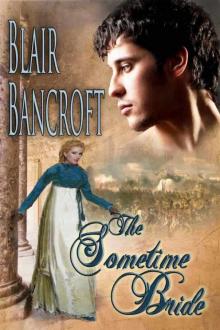 The Sometime Bride
The Sometime Bride A Season for Love
A Season for Love Death by Marriage
Death by Marriage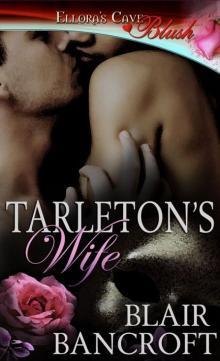 Tarleton's Wife
Tarleton's Wife Limbo Man
Limbo Man Airborne - The Hanover Restoration
Airborne - The Hanover Restoration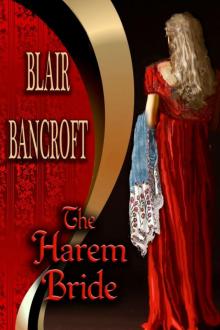 The Harem Bride
The Harem Bride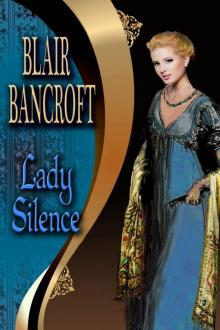 Lady Silence
Lady Silence Shadowed Paradise
Shadowed Paradise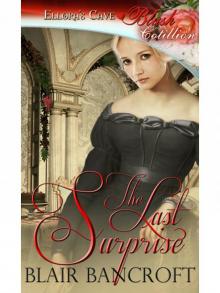 The Last Surprise
The Last Surprise Paradise Burning
Paradise Burning Florida Knight
Florida Knight A Gamble on Love
A Gamble on Love The Bastard Prince (Blue Moon Rising Book 3)
The Bastard Prince (Blue Moon Rising Book 3)